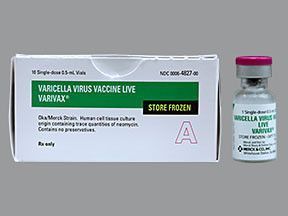VARICELLA VIRUS VACCINE (CHICKENPOX) - INJECTION
PHONETIC PRONUNCIATION: (VAR-i-SEL-a)
COMMON BRAND NAME(S): Varivax
GENERIC NAME(S): varicella virus vaccine live/PF
Uses
USES: This vaccine is used to help prevent varicella virus infection (commonly known as chickenpox). Chickenpox is a common childhood illness, but can cause more serious illnesses in people who have not yet had either chickenpox or this vaccine. Serious (rarely fatal) problems (such as pneumonia and inflammation of the liver or brain) may rarely occur from this infection, and first-time infections in adults may be very severe. It may also cause a very serious brain/liver condition called Reyes syndrome in children or teenagers. If you are infected while pregnant, your unborn infant may be harmed. Vaccination during childhood may help prevent this infection and the problems that can occur. The virus in this vaccine is alive, but it has been weakened (attenuated) and therefore has a decreased ability to cause illness. It works by helping the body produce immunity (protection) that will prevent you from getting chickenpox, or will lessen the seriousness of the infection. As with any vaccine, it may not fully protect everyone who receives it. People who get chickenpox after getting the vaccine usually have mild cases with fewer blisters, fewer fevers, and faster recoveries. The vaccine is recommended for children 12 months and older and adults who have not had chickenpox or received a varicella vaccination before.
How to use VARICELLA VIRUS VACCINE (CHICKENPOX) - INJECTION
HOW TO USE: Read all vaccine information available from your health care professional before receiving the vaccine. If you have any questions, ask your health care professional. This vaccine is usually given by injection under the skin by a health care professional. Depending on the brand, children aged 12 months to 12 years usually receive 1 or 2 doses. Teenagers 13 years and older and adults usually receive 2 doses 4 to 8 weeks apart. Closely follow the vaccination schedule provided by the health care professional.
Side Effects
Precautions
Interactions
Overdose
Images
Reviews
Faq for VARICELLA VIRUS VACCINE (CHICKENPOX) - INJECTION
The varicella virus vaccine, commonly known as the chickenpox vaccine, is a vaccine that protects against the varicella-zoster virus (VZV), which causes chickenpox.
The vaccine contains a weakened form of the varicella-zoster virus. When injected, it stimulates the immune system to produce antibodies against the virus. These antibodies help prevent infection or reduce the severity of symptoms if a person is exposed to the virus in the future.
The vaccine is recommended for children and adolescents aged 12 months to 18 years who have not had chickenpox. It is also recommended for adults who have never had chickenpox or who have not been vaccinated before.
Most people have no side effects from the vaccine. However, some individuals may experience mild side effects like soreness or swelling at the injection site, fever, or a mild rash. Serious side effects are rare.
For children aged 12 months to 12 years, two doses of the vaccine are required, with at least 3 months between doses. For adolescents and adults, two doses are also recommended, but they should be administered at least 4 weeks apart.
While the vaccine is highly effective, it is not 100% guaranteed to prevent all cases of chickenpox. However, it significantly reduces the risk of getting the disease and decreases the severity of symptoms if infection occurs.
No, if an individual has already had chickenpox, they are considered immune and do not need the vaccine.
Studies have shown that the vaccine provides long-lasting immunity, but some individuals may still be susceptible to the virus later in life. However, even if a vaccinated person develops chickenpox, the symptoms are usually milder compared to those who have not received the vaccine.
Yes, the varicella virus vaccine can be given at the same time as other vaccines, including those recommended for children, such as the measles-mumps-rubella (MMR) vaccine.
Disclaimer
IMPORTANT: HOW TO USE THIS INFORMATION: This is a summary and does NOT have all possible information about this product. This information does not assure that this product is safe, effective, or appropriate for you. This information is not individual medical advice and does not substitute for the advice of your health care professional. Always ask your health care professional for complete information about this product and your specific health needs.


No Reviews Yet